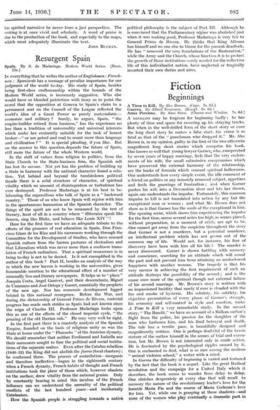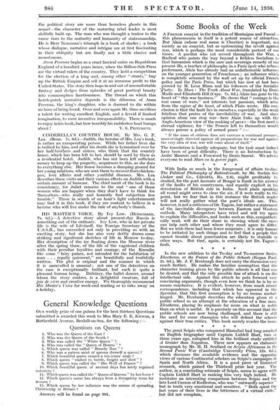Fiction
Beginnings
A Time to Kill. By Alec Brown. (Cape. 7s. 6d.) Guerra. By Alfred Neumann. (Knopf. 8s. 6d.)
Anna Perenna. By Alan Sims. (Chatto and Windus. 7s. 6c1.) A NOVELIST may be forgiven for beginning badly ; he has plenty of time and space for covering up his straying tracks. But when in the well-drilled form of the short story or even the long short story he makes a false start, his crime is as fatal as that of the " guardsman who dropped it." Mr. Alec Brown is, in my opinion, guilty in the first of the two otherwise magnificent long short stories which comprise his book. One knows so well that young lawyer Gamer, who, exasperated by seven years of happy marriage, feels that the very endear- ments of his wife, the small submissive compromises which have preserved the external harmony of the relationship, are the husks of formula which conceal spiritual hollowness.
• One understands how every simple event, the idle comment of • a friend on politics or any remotely removed subject, appetizes and feeds the gnawings of frustration ; and when Garner pushes his wife into a Devonshire river and lets her drown, again one understands the impulse. Fortunately, this common impulse to kill is not translated into action by any but the ' exceptional man or woman ; and what Mr. Brown does not show us is that Garner has the seeds of the exceptional in him. The opening scene, which shows him experiencing the impulse for the first time, seems several notes too high, as scenes placed, without preparation, in a moment of crisis, are apt to be . One cannot get away from the suspicion throughout the story that Garner is not a murderer, but a potential murderer, • an intellectual problem which has not grown out of the common sap of life. Would not, for instance, his fear of discovery have been with him all his life ? The murder is never discovered. Garner is shown battling with memory and conscience, searching for an attitude which will annul the past and not prevent him from attaining an unshadowed happiness with another woman. The tragedy is that his very success in achieving the first requirement of such an 'attitude destroys the possibility of the second ; and is the cause once more of the spiritual though not external failure of his second marriage. Mr. Brown's story is written with an impassioned lucidity that rarely if ever is clouded with the fire and smoke of hysteria. His sobriety, his subtlety, his objective presentation of every phase of Garners struggle, his economy and self-control in style and emotion, make A Time to Kill a very remarkable study. In the second story, " The Bandit," we have an account of a Balkan outlaw's flight from the police, his passion for the daughter of the 'man who harbours him, and his final betrayal and death. The tale has a terrific pace, is beautifully designed and magnificently written. One is perhaps doubtful of the heroic stature of the outlaw himself in the scenes of trial and execu- tion, but Mr. Brown is not interested only in crude action. He is fascinated by the psychological ripples caused by it. One is enchanted to find, what is so rare among the modern " animal violence school," a writer with a mind.
In Guerra the difficulty of beginning is varied and tortured by the fact that the book is a sequel. Like the great Radical :revolution and the campaign for a United Italy which it describes, the book seems to wander from delay to delay. One clutches desperately at every clue that will recall to Memory the nature of the revolutionary leader's love for the humble Maria Pia and the course of Maria Corleone's love for him. Yet, while one is grasping at these shadows—and none of the women who play eventually a dramatic part in the political story are more than homeless ghosts in this sequel—the character of the maturing rebel leader is most skilfully built up. The man who was thought a traitor to the cause rises to the maturity and humanity of statesmanship. He is Herr Neumann's triumph -in a book of shades ; a book whose dialogue, narrative and intrigue are at first fascinating in their obliquity but are finally not a little elusive and monotonous.
Anna Perenna begins as a cruel farcical satire on Republican England of a hundred years hence, when the Billion-Sale Press are the virtual rulers of the country. They hold a competition for the election of a king and, among other " stunts," buy up the British Empire and sell it at an immense profit to the United States. The story then hops in and out of uncomfortable fantasy and dodges from episodes of. great poetical beauty into commonplace facetiousness. The thread on which this hotch-potch narrative depends is the dilemma of Anna Pcrenna, the king's daughter, who is doomed to die within an hour of being loved. Over and over again Mr. Sims sacrifices a talent for writing excellent English, and a fervid if limited imagination, to mere inventive irresponsibility. There is much to enjoy in his book, but how horribly his rudderless boat bumps



































 Previous page
Previous page